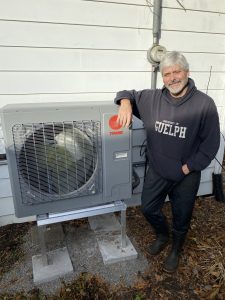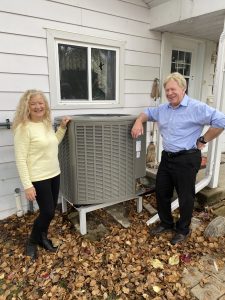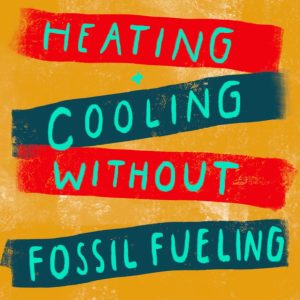In November 2023, Orillia Matters ran a story on local residents who had recently installed heat pumps in their home. (See https://www.orilliamatters.com/local-news/we-had-no-choice-orillia-homeowners-make-switch-to-heat-pumps-7859335)
Readers were promised a follow-up story in the spring of 2024, reporting on the experience of these new users over the course of the recent winter.
Mark and Sandi Bisset had a heat pump installed in their home last fall. In November 2023, Mark had this to say about their new fully-electric system:
 “We love it so far. We haven’t got any complaints. It’s quieter than I expected it to be. So far, everything’s working well.” And now? – in June of 2024? “We remained comfortable all winter. We had a couple of –20C nights and it kept up fine. The heat itself was very comfortable, very steady. It was continuous with no periods of hot and cold – no extremes – it was moderate and lovely.
“We love it so far. We haven’t got any complaints. It’s quieter than I expected it to be. So far, everything’s working well.” And now? – in June of 2024? “We remained comfortable all winter. We had a couple of –20C nights and it kept up fine. The heat itself was very comfortable, very steady. It was continuous with no periods of hot and cold – no extremes – it was moderate and lovely.
“The fan runs pretty constantly through a filter. I’m certain our house smells better.”, says Sandi. “It seems fresher and cleaner. The air quality is better – more moist with less winter static. The sound didn’t bother us – it’s a gentle white noise, from the constant air movement.”
What about the cost? “Until we have a full year,” says Mark, “it’s hard to say much about costs as we make monthly annualized payments. It will take a year before we can make an apples-to-apples comparison. We got the government support eventually – it took about 32 weeks. The application process was pretty straightforward and not a big deal, but the wait was annoying. Generally speaking though, we’re happy.”
At the time of their November 2023 interview, Donna Gowland and Jim McMahon were wondering if they were making the right decision. “It’s so new,” said Donna at the time.
Six months later, they are now in a better position to comment on the experience of their first Orillia winter relying on a heat pump.
 In spite of a few “hiccups”, they reported they are quite happy with their decision. “Once we mastered the complex thermometer settings, our new heat pump performed fabulously well – of course it was an unusual winter. It was also a very good move financially. We only have numbers so far for an 8-month period. While our 2022-23 expense for combined oil and electricity (Sept/22-Apr/23) was $4,063 + $1,545 = $5,608, our 2023-24 gas and electricity costs (Sept/23-Apr/24) were $272 + $2,178 = $2,450 – a savings of $3,158.”
In spite of a few “hiccups”, they reported they are quite happy with their decision. “Once we mastered the complex thermometer settings, our new heat pump performed fabulously well – of course it was an unusual winter. It was also a very good move financially. We only have numbers so far for an 8-month period. While our 2022-23 expense for combined oil and electricity (Sept/22-Apr/23) was $4,063 + $1,545 = $5,608, our 2023-24 gas and electricity costs (Sept/23-Apr/24) were $272 + $2,178 = $2,450 – a savings of $3,158.”
They also had the benefit of the government subsidy. “We received our government cheque for $5,850. That gives a satisfying feeling and takes the edge off the cost. There is a backlog, so expect perhaps 9 months to receive the government incentive.”
What about the heat pump’s performance? “We were comfortable,” they reported. “The heat that comes through the ducts is tepid, but it maintains a level of heat that we were happy with. During normal operation of the heat pump, the house is already warm so only slightly warm air comes through the ducts. However it runs for much longer periods, and so very warm air is not required.
“Rooms at the far ends of the house were not warm enough, so we added a couple of wireless, remote sensors. They made a huge difference and were well worth the additional cost of $68.00 each.”
Donna and Jim noted that “the installers are learning too; they don’t all have a lot of previous experience. We had six quotes from HVAC installers. Some of their information was wrong or exaggerated – such as implying the heat pump will heat the house down to -20C, or even -30C, and some of their recommendations were unnecessary – such as replacing a perfectly functional plenum from the old gas furnace.”
 Of course, no two houses are the same, nor are heat pumps’ size and capacity. Donna and Jim learned that, “although it’s true that a heat pump can extract warmth out of the air at -25, the amount of heat produced is utterly insufficient to keep our house satisfactorily warm. Our installer set the (back-up) gas furnace to come on at -5C. He said we would not be happy during quick drops in temperature if we set it to cut in at, say, -15C. This is because when the outside temperature drops at night, the heat pump can take a very long time to bring the inside temperature up to a comfortable level. Not every house is the same, and so we experimented with setting the gas cut-in temperature at -10C, and we were still quite comfortable. We may experiment next winter by setting the gas cut-in at perhaps -12C. Incidentally, when the gas furnace kicks in, the heat pump must be off. This happens automatically. And that means that during a long cold snap below -10C, our heat pump does nothing. So much for those misleading claims that made us think we’d have cheap heat down to -25C or -30C.
Of course, no two houses are the same, nor are heat pumps’ size and capacity. Donna and Jim learned that, “although it’s true that a heat pump can extract warmth out of the air at -25, the amount of heat produced is utterly insufficient to keep our house satisfactorily warm. Our installer set the (back-up) gas furnace to come on at -5C. He said we would not be happy during quick drops in temperature if we set it to cut in at, say, -15C. This is because when the outside temperature drops at night, the heat pump can take a very long time to bring the inside temperature up to a comfortable level. Not every house is the same, and so we experimented with setting the gas cut-in temperature at -10C, and we were still quite comfortable. We may experiment next winter by setting the gas cut-in at perhaps -12C. Incidentally, when the gas furnace kicks in, the heat pump must be off. This happens automatically. And that means that during a long cold snap below -10C, our heat pump does nothing. So much for those misleading claims that made us think we’d have cheap heat down to -25C or -30C.
It took us a lot of time to sort through all the options and data, and determine which installer’s plan made the most sense. Estimates from three installers would not have been enough in our case, because of the variance in product information, quality, opinions, costs and particularly the fast availability of parts and service in an emergency. We did not want to be held ransom to parts that were warehoused out of province. Everybody in the industry is still learning.”
Are Donna and Jim new fans of heat pumps? “We’re very keen. We definitely made the right decision. The heat pump has performed well. We don’t miss our old oil furnace. We now have the reassurance of redundancy where the gas not only assists the heat pump, but can be a back-up as well. And we used very little gas over the winter ($68 in fuel cost).”
When asked if they have any other advice for those considering a heat pump, here’s what Jim and Donna had to say: “If you heated with oil in the past, watch the delivery truck doesn’t still come and try to fill your oil tank! And if you’re having a gas line installed, be there on the spot if it matters to you where the pipeline and meter are placed.”
Heat pumps are a tried and true technology that can efficiently heat and cool a home. They can keep people warm in harsh winters and cool in the increasingly sweltering summers. They are gaining popularity amongst both the public and decision-makers thanks in part to the success of programs like PEI’s Net Zero Free Heat Pump Program, or a newly expanded heat pump rebate program in BC. Public support is building for a universal heat pump program that leaves no one behind.

